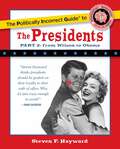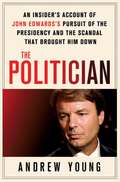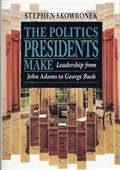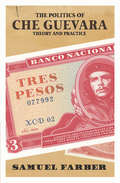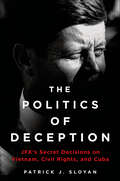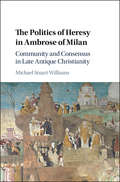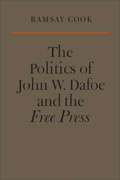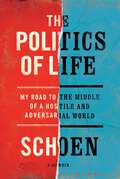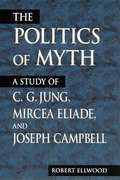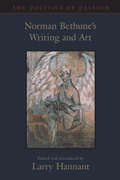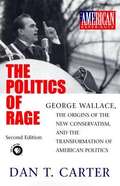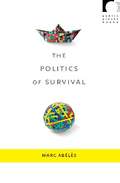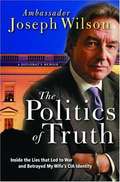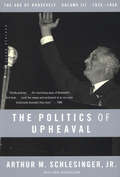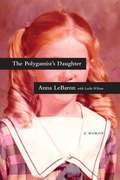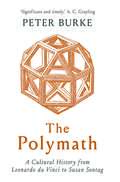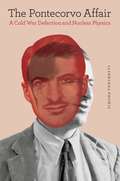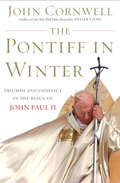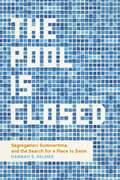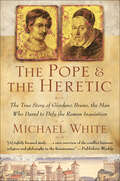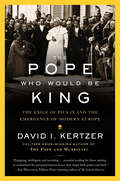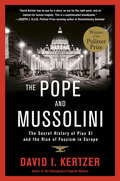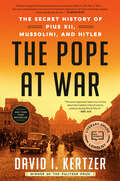- Table View
- List View
The Politically Incorrect Guide to the Presidents, Part 2: From Wilson to Obama (The Politically Incorrect Guides)
by Steven F. Hayward"Steven Hayward thinks presidents should be graded on their loyalty to their oath of office. Why, it’s just crazy enough to work!”--Jonah GoldbergGovernment scholar Steven Hayward is ready to debunk some of the biggest presidential myths Americans believe are facts.In Politically Incorrect Guide to the Presidents, Part 2, he traces the legacy of each president from Wilson to Obama and along the way reveals truths most Americans never heard.JFK was assassinated by a Communist. FDR had the right to run against Hoover. Wilson openly criticized the Constitution. And the 2000 election did, in fact, reach the correct outcome. Uncover new revelations about each President and prepare yourself for an unvarnished look at the truth.
The Politician: An Insider's Account of John Edwards's Pursuit of the Presidency and the Scandal That Brought Him Down
by Andrew Young"The Politician" offers a look at the trajectory which made John Edwards the ideal Democratic candidate for president, and the hubris which brought him down, leaving his career, his marriage, and his dreams in ashes.
The Politics Presidents Make: Leadership from John Adams to George Bush
by Stephen SkowronekStephen Skowronek's wholly innovative study demonstrates that presidents are persistent agents of change, continually disrupting and transforming the political landscape. In an afterword to this new edition, the author examines "third way" leadership as it has been practiced by Bill Clinton and others. These leaders are neither great repudiators nor orthodox innovators. They challenge received political categories, mix seemingly antithetical doctrines, and often take their opponents' issues as their own. As the 1996 election confirmed, third way leadership has great electoral appeal. The question is whether Clinton in his second term will escape the convulsive end so often associated with the type.
The Politics of Che Guevara: Theory and Practice
by Samuel FarberThis reexamination of Ernesto "Che" Guevara's thoughts on socialism, democracy, and revolution is a must-read for today's activists--or anyone longing to fight for a better world.Fifty years after his death, Guevara remains a symbol to legions of young rebels and revolutionaries. This unique book provides a way to critically engage with Guevara's economic views, his ideas about revolutionary agency, and his conduct as guerrilla commander and government administrator in Cuba.Samuel Farber was born and raised in Cuba. He has written extensively on Cuba and the Cuban Revolution and is author of Cuba Since the Revolution of 1959.
The Politics of Deception: JFK's Secret Decisions on Vietnam, Civil Rights, and Cuba
by Patrick J. SloyanInvestigative reporter Patrick J. Sloyan, a former member of the White House Press Corps, revisits the last years of John F. Kennedy's presidency, his fateful involvement with Diem's assassination, the Cuban Missile Crisis and the Civil Rights Movement. Using recently released White House tape recordings and interviews with key inside players, The Politics of Deception reveals:Kennedy's secret behind-the-scenes deals to resolve the Cuban Missile Crisis.The overthrow and assassination of President Diem.Kennedy's hostile interactions with and attempts to undermine Martin Luther King, Jr. Kennedy's secret and fascinating dealings with Diem, General Curtis LeMay, King and Fidel Castro. Kennedy's last year in office, and his preparation for the election that never was.The Politics of Deception is a fresh and revealing look at an iconic president and the way he attempted to manage public opinion and forge his legacy, sure to appeal to both history buffs and those who were alive during his presidency.
The Politics of Heresy in Ambrose of Milan: Community and Consensus in Late Antique Christianity
by Williams Michael StuartAmbrose of Milan is famous above all for his struggle with, and triumph over, 'Arian' heresy. Yet, almost all of the evidence comes from Ambrose's own writings, and from pious historians of the next generation who represented him as a champion of orthodoxy. This detailed study argues instead that an 'Arian' opposition in Milan was largely conjured up by Ambrose himself, lumping together critics and outsiders in order to secure and justify his own authority. Along with new interpretations of Ambrose's election as bishop, his controversies over the faith, and his clashes with the imperial court, this book provides a new understanding of the nature and significance of heretical communities in Late Antiquity. In place of rival congregations inflexibly committed to doctrinal beliefs, it envisages a world of more fluid allegiances in which heresy - but also consensus - could be a matter of deploying the right rhetorical frame.
The Politics of John W. Dafoe and the Free Press
by Ramsay CookJohn W. Dafoe was a dominant figure in western Canadian political history during the first half of the twentieth century. As editor of the Winnipeg Free Press from 1901 to 1944, he gained an international reputation for his perceptive analysis of the issues facing Canada and the world. He was at the centre of almost every major political development of his time: he advised prime ministers, was deeply involved in organizing the Progressive party, and was a member of the crucial Rowell-Sirois Commission on federal-provincial relations. His influence was enormous, and at the time of his death he was widely regarded as the nation's most distinguished editor. This book is a study at close quarters of Dafoe, the man of politics. It focuses on the Dafoe who read and studied and the Dafoe who observed men and events; on Dafoe in his centre of operation and at the Free Press and Dafoe moving watchfully about the country and abroad when critical decisions were in the making; on the ideas confided in letters to friends and the ideas delivered in public speeches; on contributions made to conferences and commissions and advice given to political figures. The book is not intended as a complete biography of Dafoe in all his aspects, but it is even less an abstract treatise in the field of political theory. It is the biography of a political mind. The impression is of a mind recalled to its full vigour, for no prejudgments have been made about it and no restraints upon it. Ramsay Cook treats his subject with candour, but also with understanding and a sense of humour. He has ordered his material with extraordinary skill, so that his book is enjoyable reading as well as a valuable source of information about a distinguished Canadian and a momentous period in Canadian history.
The Politics of Life: My Road to the Middle of a Hostile and Adversarial World
by Douglas E SchoenDuring his more than 50 years in politics, Democratic strategist Douglas E. Schoen has produced nearly two dozen books that have deftly dissected national and international crises and offered prescriptions for solving them. Now, in The Politics of Life: My Road to the Middle of a Hostile and Adversarial World, Schoen delivers his most personal work. Bringing to life the antiwar youthquake of his Harvard years, Schoen introduces us to Cornel West, Walter Isaacson, Merrick Garland, and other classmates bound for glory. A tense summer in Mississippi helps Schoen appreciate the long game of candidate Charles Evers, a bootlegger-pimp turned civil rights crusader. In New York, he witnesses the twilight of clubhouse power as he canvasses for society swell Carter Burden, &“mob priest&” Louis Gigante, and Ed (How&’m doin&’?) Koch. Taking time out for his own run for Congress, Schoen joins data wunderkind Mark Penn in pioneering overnight polling – getting to know everyone from Camelot heir Ted Kennedy to crack-smoking mayor Marion Barry to a brash developer named Donald Trump. Penn & Schoen evolves into a global consultancy, taking on strongmen in Serbia, Mexico, Zimbabwe, Turkey, and Venezuela. Two of its clients are assassinated. Three win the Nobel Peace Prize. In 1996, the duo guides beleaguered President Bill Clinton to a second term and through a wrenching sex scandal. Using a unique strategy for micro-targeting voters, the firm helps give Mayor Michael Bloomberg the time he needs to steer New York City to a recovery after 9/11.A HALF-CENTURY IN POLITICS WAR STORIES AND WISDOM Schoen seems to be on top of the world when a British multinational pays a fortune for Penn & Schoen. Out on his own, he shrugs off a new generation of progressives who mock his centrist views and his willingness to debate conservatives on Fox News. Gradually, he reinvents himself. He becomes a syndicated columnist, co-founds a new polling company, immerses himself in Ukraine&’s struggle against Russia, and saddles up again with Michael Bloomberg to help oust now-President Trump. Along the way, some former critics admit Schoen might have been right. Brimming with ripping yarns from campaign war rooms, The Politics of Life is also a manual for living a productive and happy life. Sprinkled through the memoir are the author&’s &“Schoenisms&” – lessons he&’s learned the hard way: • It helps if your opinion is correct. But first, it should sound convincing. • Take on a despot when he first threatens you. Bullies only get bigger. • Martyrdom is overrated. Don't fall on any swords unless there&’s an ambulance on the way. • Shaming and blaming your opponents might impress your allies. But it doesn&’t accomplish much – aside from chasing people away from the bargaining table. • Don&’t waste time on feuds. Grudges sap your strength and hurt you almost as much as the person you&’re fighting. • Most people are mixtures of light and darkness. Life is about learning the moral gradients – the grayscale – and deciding how much shadow you can live with.
The Politics of Myth: A Study of C. G. Jung, Mircea Eliade, and Joseph Campbell
by Robert EllwoodEllwood (Religion, U. of Southern California) delves into the political views implicit in the mythological theories of probably the three best-known popularizers of myth in the 20th century. He points that all three emerged from the anti-modern pessimism and romanticism that also generated European fascism, and have all been accused of holding fascists and anti-Semitic sentiments. He assesses those charges in light of their entire career and lifetime contribution.
The Politics of Passion: Norman Bethune's Writing and Art
by Larry Hannant Norman BethuneThe Politics of Passion is the first comprehensive collection of the writing and art of Dr Norman Bethune. A Canadian medical pioneer and a communist, Bethune gained fame during the 1930s while serving in the Spanish Civil War and participating in China's struggle against Japanese invasion.This book sheds light on the man, the artist, and the revolutionary. It uncovers new historical material relating to several controversies surrounding Bethune. A remarkable document obtained from the Communist International Archives in Moscow, for instance, discusses why Bethune was sent home in disgrace from the Spanish Civil War. It refers to a mysterious Swedish woman, Kajsa von Rothman, who was Bethune's lover and who was believed by left-wing Spanish authorities to be politically suspect.This collection of Bethune's writings and art reveals that politics preoccupied him only during the last four years of his life. Earlier, his passionate nature found expression in medical and surgical innovation, as well as in painting, sketching, photography, writing - from poetry and short stories to letters, radio broadcasts, and plays - and public speaking. The Politics of Passion reveals the many sides of Bethune's identity, exploring not only the life of a revolutionary doctor, but of an intense and compassionate artist.
The Politics of Rage: George Wallace, the Origins of the New Conservatism, and the Transformation of American Politics
by Dan T. CarterCombining biography with regional and national history, Dan T. Carter chronicles the dramatic rise and fall of George Wallace, a populist who abandoned his ideals to become a national symbol of racism, and later begged for forgiveness. In The Politics of Rage, Carter argues persuasively that the four-time Alabama governor and fourtime presidential candidate helped to establish the conservative political movement that put Ronald Reagan in the White House in 1980 and gave Newt Gingrich and the Republicans control of Congress in 1994. In this second edition, Carter updates Wallace's story with a look at the politician's death and the nation's reaction to it and gives a summary of his own sense of the legacy of "the most important loser in twentieth-century American politics."
The Politics of Survival
by Marc AbélésIn this provocative analysis of global politics, the anthropologist Marc Abls argues that the meaning and aims of political action have radically changed in the era of globalization. As dangers such as terrorism and global warming have moved to the fore of global consciousness, foreboding has replaced the belief that tomorrow will be better than today. Survival, outlasting the uncertainties and threats of a precarious future, has supplanted harmonious coexistence as the primary goal of politics. Abls contends that this political reorientation has changed our priorities and modes of political action, and generated new debates and initiatives. The proliferation of supranational and transnational organizations--from the European Union to the World Trade Organization (WTO) to Oxfam--is the visible effect of this radical transformation in our relationship to the political realm. Areas of governance as diverse as the economy, the environment, and human rights have been partially taken over by such agencies. Non-governmental organizations in particular have become linked with the mindset of risk and uncertainty; they both reflect and help produce the politics of survival. Abls examines the new global politics, which assumes many forms and is enacted by diverse figures with varied sympathies: the officials at meetings of the WTO and the demonstrators outside them, celebrity activists, and online contributors to international charities. He makes an impassioned case that our accounts of globalization need to reckon with the preoccupations and affiliations now driving global politics. The Politics of Survival was first published in France in 2006. This English-language edition has been revised and includes a new preface.
The Politics of Truth: A Diplomat's Memoir
by Joseph WilsonAmbassador Wilson writes a very engaging memoir of how he wound up in the diplomatic service. We follow his career from support staff overseas, to ambassador of several small African nations. He was also the last charge d'affairs in Iraq after the war began in 1990. He tells the story of how he got tangled up in the hardball and brutal politics of the current Bush administration, and how it differs from the norms of civil discourse in politics, and even from the first Bush administration, which praised Wilson lavishly.
The Politics of Upheaval: The Age of Roosevelt, 1935–1936 (The Age of Roosevelt #3)
by Arthur M. Schlesinger Jr.In the third volume of his series on Franklin Roosevelt, the Pulitzer Prize–winning historian focuses on the turbulent final years of FDR&’s first term.A measure of economic recovery revived political conflict and emboldened Roosevelt&’s critics to denounce &“that man in the White house.&” To his left were demagogues—Huey Long, Father Coughlin, and Dr. Townsend. To his right were the champions of the old order—ex-president Herbert Hoover, the American Liberty League, and the august Supreme Court. For a time, the New Deal seemed to lose its momentum. But in 1935 FDR rallied and produced a legislative record even more impressive than the Hundred Days of 1933—a set of statutes that transformed the social and economic landscape of American life. In 1936 FDR coasted to reelection on a landslide. Schlesinger has his usual touch with colorful personalities and draws a warmly sympathetic portrait of Alf M. Landon, the Republican candidate of 1936.&“One of the most important historical enterprises of our time.&”—Saturday Review &“Vividly portrays…the concluding years of Roosevelt&’s first term…[and] the sweep and excitement of an era more historically dramatic than most.&”—Time
The Polygamist's Daughter: A Memoir
by Anna LeBaron Leslie WilsonMy father had thirteen wives and more than fifty children . . . This is the haunting memoir of Anna LeBaron, daughter of the notorious polygamist and murderer Ervil LeBaron. Ervil’s criminal activity kept Anna and her siblings constantly on the run from the FBI. Often starving, the children lived in a perpetual state of fear—and despite their numbers, Anna always felt alone. Would she ever find a place she truly belonged? Would she ever be anything other than the polygamist’s daughter? Filled with murder, fear, and betrayal, The Polygamist’s Daughter is the harrowing, heart-wrenching story of a fatherless girl and her unwavering search for love, faith, and a place to call home.
The Polymath: A Cultural History from Leonardo da Vinci to Susan Sontag
by Peter BurkeThe first history of the western polymath, from the fifteenth century to the present day From Leonardo Da Vinci to John Dee and Comenius, from George Eliot to Oliver Sacks and Susan Sontag, polymaths have moved the frontiers of knowledge in countless ways. But history can be unkind to scholars with such encyclopaedic interests. All too often these individuals are remembered for just one part of their valuable achievements. In this engaging, erudite account, renowned cultural historian Peter Burke argues for a more rounded view. Identifying 500 western polymaths, Burke explores their wide-ranging successes and shows how their rise matched a rapid growth of knowledge in the age of the invention of printing, the discovery of the New World and the Scientific Revolution. It is only more recently that the further acceleration of knowledge has led to increased specialisation and to an environment that is less supportive of wide-ranging scholars and scientists. Spanning the Renaissance to the present day, Burke changes our understanding of this remarkable intellectual species.
The Pontecorvo Affair: A Cold War Defection and Nuclear Physics
by Simone TurchettiIn the fall of 1950, newspapers around the world reported that the Italian-born nuclear physicist Bruno Pontecorvo and his family had mysteriously disappeared while returning to Britain from a holiday trip. Because Pontecorvo was known to be an expert working for the UK Atomic Energy Research Establishment, this raised immediate concern for the safety of atomic secrets, especially when it became known in the following months that he had defected to the Soviet Union. Was Pontecorvo a spy? Did he know and pass sensitive information about the bomb to Soviet experts? At the time, nuclear scientists, security personnel, Western government officials, and journalists assessed the case, but their efforts were inconclusive and speculations quickly turned to silence. In the years since, some have downplayed Pontecorvo's knowledge of atomic weaponry, while others have claimed him as part of a spy ring that infiltrated the Manhattan Project. The Pontecorvo Affair draws from newly disclosed sources to challenge previous attempts to solve the case, offering a balanced and well-documented account of Pontecorvo, his activities, and his possible motivations for defecting. Along the way, Simone Turchetti reconsiders the place of nuclear physics and nuclear physicists in the twentieth century and reveals that as the discipline's promise of military and industrial uses came to the fore, so did the enforcement of new secrecy provisions on the few experts in the world specializing in its application.
The Pontecorvo Affair: A Cold War Defection and Nuclear Physics
by Simone TurchettiIn the fall of 1950, newspapers around the world reported that the Italian-born nuclear physicist Bruno Pontecorvo and his family had mysteriously disappeared while returning to Britain from a holiday trip. Because Pontecorvo was known to be an expert working for the UK Atomic Energy Research Establishment, this raised immediate concern for the safety of atomic secrets, especially when it became known in the following months that he had defected to the Soviet Union. Was Pontecorvo a spy? Did he know and pass sensitive information about the bomb to Soviet experts? At the time, nuclear scientists, security personnel, Western government officials, and journalists assessed the case, but their efforts were inconclusive and speculations quickly turned to silence. In the years since, some have downplayed Pontecorvo’s knowledge of atomic weaponry, while others have claimed him as part of a spy ring that infiltrated the Manhattan Project. The Pontecorvo Affair draws from newly disclosed sources to challenge previous attempts to solve the case, offering a balanced and well-documented account of Pontecorvo, his activities, and his possible motivations for defecting. Along the way, Simone Turchetti reconsiders the place of nuclear physics and nuclear physicists in the twentieth century and reveals that as the discipline’s promise of military and industrial uses came to the fore, so did the enforcement of new secrecy provisions on the few experts in the world specializing in its application.
The Pontiff in Winter: Triumph and Conflict in the Reign of John Paul II
by John CornwellOver more than a quarter of a century, John Paul II has firmly set his stamp on the billion-member strong Catholic Church for future generations and he has become one of the most influential political figures in the world. His key role in the downfall of communism in Europe, as well as his apologies for the Catholic Church's treatment of Jews and to victims of the Inquisition, racism, and religious wars, won him worldwide admiration. Yet his papacy has also been marked by what many perceive as misogyny, homophobia, and ecclesiastical tyranny. Some critics suggest that his perpetuation of the Church's traditional hierarchical paternalism contributed to pedophiliac behavior in the priesthood and encouraged superiors to sweep the crimes under the carpet. The Pontiff in Winterbrings John Paul's complex, contradictory character into sharp focus. In a bold, highly original work, John Cornwell argues that John Paul's mystical view of history and conviction that his mission has been divinely established are central to understanding his pontificate. Focusing on the period from the eve of the millennium to the present, Cornwell shows how John Paul's increasing sense of providential rightness profoundly influenced his reactions to turbulence in the secular world and within the Church, including the 9/11 attacks, the pedophilia scandals in the United States, the clash between Islam and Christianity, the ongoing debates over the Church's policies regarding women, homosexuals, abortion, AIDS, and other social issues, and much more. A close, trusted observer of the Vatican, Cornwell combines eyewitness reporting with information from the best sources in and outside the pope's inner circle. Always respectful of John Paul's prodigious spirit and unrelenting battles for human rights and religious freedom, Cornwell raises serious questions about a system that grants lifetime power to an individual vulnerable to the vicissitudes of aging and illness. The result is a moving, elegiac portrait of John Paul in the winter of his life and a thoughtful, incisive assessment of his legacy to the Church.
The Pool Is Closed: Segregation, Summertime, and the Search for a Place to Swim
by Hannah S. PalmerIn 2018, while teaching her kids to swim and working on urban river restoration projects, Hannah S. Palmer began a journal of social encounters with water. As she found herself dangling her feet in a seemingly all-white swimming pool, she started to worry about how her young sons would learn to swim. Would they grow up accustomed to the stubbornly segregated pools of Atlanta? Was it safe for them to wade in creeks laced with urban runoff or dive into the ever-warming, man-made swimming holes of the South? Should they just join the Y?But these weren’t just parenting questions. In the South, how we swim—and whether we have access to water at all—is tied up in race and class. As she took her sons pool-hopping across Atlanta, Palmer found an intimate lens through which to view the city’s neighborhoods. In The Pool Is Closed, she documents the creeks behind fences, the springs in the sewers, the lakes that had all but vanished since her own parents learned to swim. In the process, she uncovers complex stories about environmental history, water policy, and the racial politics of public spaces.Nothing prepared Palmer for the contamination, sewage, and bodies that appear when you look at water too long. Her search for water became compulsive, a way to make sense of the world. The Pool Is Closed is a book about water: where it flows and where it floods, who owns it, and what it costs. It’s also a story about embracing parenthood in a time of environmental catastrophe and political anxiety, of dwindling public space and natural resources. It chronicles a year-long quest to find a place to swim and finding, instead, what makes shared water so threatening and wild.
The Pope & the Heretic: The True Story of Giordano Bruno, the Man Who Dared to Defy the Roman Inquisition
by Michael WhiteThe story of the trial of visionary philosopher Giordano Bruno. “A nice overview of the conflict between religion and philosophy in the Renaissance.” —Publishers WeeklyGiordano Bruno challenged everything in his pursuit of an all-embracing system of thought. This not only brought him patronage from powerful figures of the day but also put him in direct conflict with the Catholic Church. Arrested by the Inquisition and tried as a heretic, Bruno was imprisoned, tortured, and, after eight years, burned at the stake in 1600. The Vatican “regrets” the burning yet refuses to clear him of heresy.But Bruno’s philosophy spread: Galileo, Isaac Newton, Christiaan Huygens, and Gottfried Leibniz all built upon his ideas; his thought experiments predate the work of such twentieth-century luminaries as Karl Popper; his religious thinking inspired such radicals as Baruch Spinoza; and his work on the art of memory had a profound effect on William Shakespeare.Chronicling a genius whose musings helped bring about the modern world, Michael White pieces together the final years—the capture, trial, and the threat the Catholic Church felt—that made Bruno a martyr of free thought.“White’s book is exemplary for its discussions of the period’s intellectual beliefs and social structure and for its vivid detail and illuminating look at Bruno’s trial and subsequent death.” —Library Journal“Riveting.” —Birmingham Post
The Pope Who Quit: A True Medieval Tale of Mystery, Death, and Salvation
by Jon M. SweeneyThis book traces the short reign in 1296 of Pope Celestine V, the tragedy of his papacy, and his probable murder. It is well documented and a very interesting read.
The Pope Who Would Be King: The Exile of Pius IX and the Emergence of Modern Europe
by David I. KertzerThe Pulitzer Prize–winning author of The Pope and Mussolini takes on a pivotal, untold story: the bloody revolution that stripped the pope of political power and signaled the birth of modern Europe. Days after his prime minister was assassinated in the middle of Rome in November 1848, Pope Pius IX found himself a virtual prisoner in his own palace. The wave of revolution that had swept through Europe now seemed poised to end the popes’ thousand-year reign over the Papal States, if not to the papacy itself. Disguising himself as a simple parish priest, Pius escaped through a back door. Climbing inside the Bavarian ambassador’s carriage, he embarked on a journey into a fateful exile. Only two years earlier Pius’s election had triggered a wave of optimism across Italy. After the repressive reign of the dour Pope Gregory XVI, Italians saw the youthful, benevolent new pope as the man who would at last bring the Papal States into modern times and help create a new, unified Italian nation. But Pius was caught between a desire to please his subjects and a fear—stoked by the conservative cardinals—that heeding the people’s pleas would destroy the church. The resulting drama—with a colorful cast of characters, from Louis Napoleon and his rabble-rousing cousin Charles Bonaparte to Garibaldi, Tocqueville, and Metternich—was rife with treachery, tragedy, and international power politics. David Kertzer is one of the world’s foremost experts on the history of Italy and the Vatican and has a rare ability to bring that history vividly to life. With a combination of gripping, cinematic storytelling and keen historical analysis, rooted in an unprecedented richness of archival sources, The Pope Who Would Be King sheds fascinating new light on the end of rule by divine right in the West and the emergence of modern Europe. Advance praise for The Pope Who Would Be King“In this original—and even thrilling—book, David Kertzer gives us a brilliant and surprising portrait of the role of Pius IX in the making of a new democratic reality in the West. Engaging, intelligent, and revealing, The Pope Who Would Be King is essential reading for those seeking to understand the perennial human forces that shape both power and faith.”—Jon Meacham, author of Thomas Jefferson: The Art of Power“In this riveting tour de force, Kertzer shows how and why Pope Pius IX turned Roman Catholicism into the nemesis of modernity, with drastic consequences not only for the church but for the West.”—James Carroll, author of The Cloister
The Pope and Mussolini: The Secret History of Pius XI and the Rise of Fascism in Europe
by David I. KertzerFrom National Book Award finalist David I. Kertzer comes the gripping story of Pope Pius XI's secret relations with Italian dictator Benito Mussolini. This groundbreaking work, based on seven years of research in the Vatican and Fascist archives, including reports from Mussolini's spies inside the highest levels of the Church, will forever change our understanding of the Vatican's role in the rise of Fascism in Europe. The Pope and Mussolini tells the story of two men who came to power in 1922, and together changed the course of twentieth-century history. In most respects, they could not have been more different. One was scholarly and devout, the other thuggish and profane. Yet Pius XI and "Il Duce" had many things in common. They shared a distrust of democracy and a visceral hatred of Communism. Both were prone to sudden fits of temper and were fiercely protective of the prerogatives of their office. ("We have many interests to protect," the Pope declared, soon after Mussolini seized control of the government in 1922.) Each relied on the other to consolidate his power and achieve his political goals. In a challenge to the conventional history of this period, in which a heroic Church does battle with the Fascist regime, Kertzer shows how Pius XI played a crucial role in making Mussolini's dictatorship possible and keeping him in power. In exchange for Vatican support, Mussolini restored many of the privileges the Church had lost and gave in to the pope's demands that the police enforce Catholic morality. Yet in the last years of his life--as the Italian dictator grew ever closer to Hitler--the pontiff's faith in this treacherous bargain started to waver. With his health failing, he began to lash out at the Duce and threatened to denounce Mussolini's anti-Semitic racial laws before it was too late. Horrified by the threat to the Church-Fascist alliance, the Vatican's inner circle, including the future Pope Pius XII, struggled to restrain the headstrong pope from destroying a partnership that had served both the Church and the dictator for many years. The Pope and Mussolini brims with memorable portraits of the men who helped enable the reign of Fascism in Italy: Father Pietro Tacchi Venturi, Pius's personal emissary to the dictator, a wily anti-Semite known as Mussolini's Rasputin; Victor Emmanuel III, the king of Italy, an object of widespread derision who lacked the stature--literally and figuratively--to stand up to the domineering Duce; and Cardinal Secretary of State Eugenio Pacelli, whose political skills and ambition made him Mussolini's most powerful ally inside the Vatican, and positioned him to succeed the pontiff as the controversial Pius XII, whose actions during World War II would be subject for debate for decades to come. With the recent opening of the Vatican archives covering Pius XI's papacy, the full story of the Pope's complex relationship with his Fascist partner can finally be told. Vivid, dramatic, with surprises at every turn, The Pope and Mussolini is history writ large and with the lightning hand of truth. Advance praise for The Pope and Mussolini "David Kertzer has an eye for a story, an ear for the right word, and an instinct for human tragedy. They all come together in The Pope and Mussolini to document, with meticulous scholarship and novelistic flair, the complicity between Pius XI and the Fascist leader in creating an unholy alliance between the Vatican and a totalitarian government rooted in corruption and brutality. This is a sophisticated blockbuster."--Joseph J. Ellis, Pulitzer Prize-winning author of Revolutionary Summer
The Pope at War: The Secret History of Pius XII, Mussolini, and Hitler
by David I. KertzerNEW YORK TIMES BESTSELLER • &“The most important book ever written about the Catholic Church and its conduct during World War II.&”—Daniel Silva&“Kertzer brings all of his usual detective and narrative skills to [The Pope at War] . . . the most comprehensive account of the Vatican&’s relations to the Nazi and fascist regimes before and during the war.&”—The Washington Post Based on newly opened Vatican archives, a groundbreaking, explosive, and riveting book about Pope Pius XII and his actions during World War II, including how he responded to the Holocaust, by the Pulitzer Prize–winning author of The Pope and MussoliniWINNER OF THE JULIA WARD HOWE AWARD • LONGLISTED FOR THE PEN/JACQUELINE BOGRAD WELD AWARD • ONE OF THE BEST BOOKS OF THE YEAR: The New YorkerWhen Pope Pius XII died in 1958, his papers were sealed in the Vatican Secret Archives, leaving unanswered questions about what he knew and did during World War II. Those questions have only grown and festered, making Pius XII one of the most controversial popes in Church history, especially now as the Vatican prepares to canonize him.In 2020, Pius XII&’s archives were finally opened, and David I. Kertzer—widely recognized as one of the world&’s leading Vatican scholars—has been mining this new material ever since, revealing how the pope came to set aside moral leadership in order to preserve his church&’s power.Based on thousands of never-before-seen documents not only from the Vatican, but from archives in Italy, Germany, France, Britain, and the United States, The Pope at War paints a new, dramatic portrait of what the pope did and did not do as war enveloped the continent and as the Nazis began their systematic mass murder of Europe&’s Jews. The book clears away the myths and sheer falsehoods surrounding the pope&’s actions from 1939 to 1945, showing why the pope repeatedly bent to the wills of Hitler and Mussolini.Just as Kertzer&’s Pulitzer Prize–winning The Pope and Mussolini became the definitive book on Pope Pius XI and the Fascist regime, The Pope at War is destined to become the most influential account of his successor, Pius XII, and his relations with Mussolini and Hitler. Kertzer shows why no full understanding of the course of World War II is complete without knowledge of the dramatic, behind-the-scenes role played by the pope. &“This remarkably researched book is replete with revelations that deserve the adjective &‘explosive,&’&” says Kevin Madigan, Winn Professor of Ecclesiastical History at Harvard University. &“The Pope at War is a masterpiece.&”
